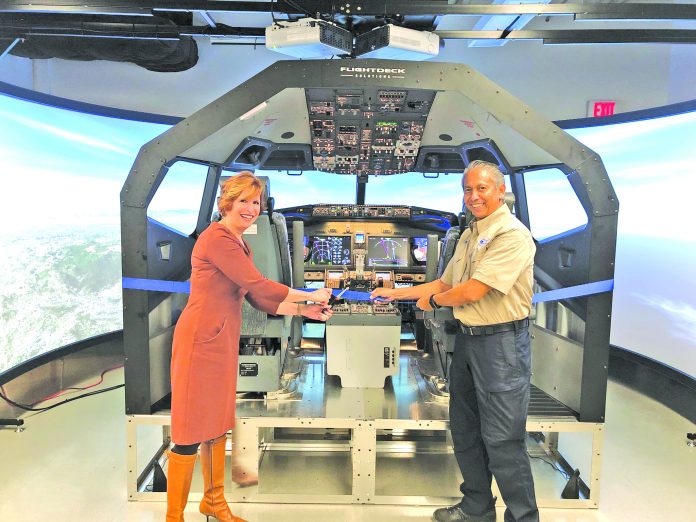
By David N. Young
Students streamed into a meeting room at Cypress College Friday to witness the unveiling of a new 737-flight simulator and listen to instructors, industry professionals and counselors available to channel their interest in the school’s aviation and travel curricula.
“We’ve got a world class program,” said Ed Valdez, a working airline captain who is also a full-time educator at Cypress College. Valdez is now Chairman of Cypress College’s aviation and travel department.
Valdez said Kathleen Reiland, the former Dean of the program, is a former flight attendant, and should be credited with revamping the program over the past decade. Reiland was instrumental in bringing in airline and tourism professionals who now give students real world instruction, he said.-
As the travel and transportation sector of the U.S. economy is booming, so are the Cypress College course offerings to students dreaming of a career in the industry.
“We keep our finger on the pulse,” said Valdez. They do so by inviting professionals from the industry to lecture students and offer them a realistic glimpse of what’s happening inside the industry.
The Cypress College program dates back to 1967. It has grown significantly, especially under Reiland, he said, as the school’s airline and travel industry course offerings now amount to four full pages of small print.
The courses now range from piloting to air navigation, from homeland security to flight servicing, from airport operations to flight attendants and almost every related career in-between.
Already a growing program, the airline and tourism curriculum got a major boost recently as an anonymous student, who had enjoyed learning on one of Valdez’s hand built simulators, donated $1 million to the program.
“The donor wanted Cypress College to build the best program in the country,” said Valdez. As a result, the college was able to acquire its latest addition, the 737-simulator, also known as a Fixed Training Device.
Using the new simulator, students can learn to fly major commercial and regional jets, said Valdez, at a significant cost savings to the students. When time permits, Valdez still pilots a few commercial flights and accepts private jet missions. “I want to keep up with the industry,” he said. Piloting, said Valdez, is the “most awesome job in the world.”
Over the years, Cypress College has built strategic relationships with key airlines like United, American, Delta, Southwest, Jet Blue and others. Meanwhile, Reiland has also created key tourism relationships with cruise lines and other major travel companies.
Instructors from Boeing and others major companies have joined the faculty.
The industry is so hot that some students “job out,” meaning they will often get hired by an airline or tourism company while still in college, said Valdez. Even so, the students do have the option to stay in school and complete their degree.
Students enrolled in the aviation and travel program are offered a variety of Associate Degrees, in addition to another list of “Certifications” that are applicable in the industry. “It means they have acquired the basic knowledge to do that job,” he said, adding that once students are certified, some do receive job offers while still attending the school.
In summary, said Valdez, Cypress College offers students “the foundational knowledge of the aviation and travel industries.” The new simulator will only enhance the college’s program and provide future pilots with the knowledge and working realism they will need to obtain their certification to fly passenger-laden jets.
Over the next decade, as many as 60 percent of pilots in the baby-boom generation will eventually retire, creating a massive demand for new airline pilots, Valdez told the attending students.
After the introductory session, students interested in piloting went across the hall with Valdez and those interested in the other aspects of the airline industry and tourism stayed with Reiland.
Valdez began his instructional career 15 years ago while furloughed from an airline, and the engineer/pilot went work building early versions of simulators, still in use at the college. The recently acquired premier Boeing 737 Max simulator is among the country’s finest and will be used to help student obtain a pilot’s license and to earn a degree. “From high school to flight school,” said Valdez.
Cypress College will soon be adding a host of drone programs, offering certifications and Associate Degrees in Unmanned Aircraft Systems. Also, he said the college was in talks over a potential educational alliance with the U.S. Air Force Academy.
Cypress College is very happy with its highflying aviation and travel program and Valdez claims it will only soar even higher in the future.
Courtesy photo:
